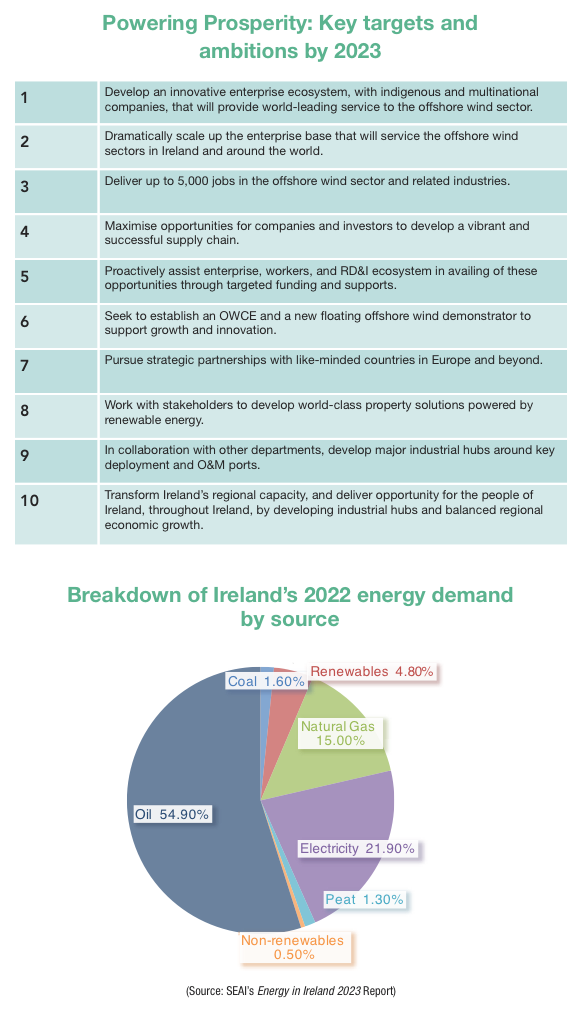Powering Prosperity: Ireland’s Offshore Wind Industrial Strategy

Delivering on a Programme for Government commitment, and consolidating on the White Paper on Enterprise 2022-2030, Powering Prosperity: Ireland’s Offshore Wind Industrial Strategy aspires to build a “successful, vibrant, and impactful offshore wind energy industry”.
The first strategy of its kind in the State, Powering Prosperity aims to ensure that that the energy sector “creates as much value as possible throughout Ireland and maximises the economic benefits associated with government ambitions to deliver its 2030, 2040, and 2050 offshore wind targets”.
The strategy focuses on building a “strong and resilient offshore wind supply chain in Ireland” and is based on four pillars:
- supply chain (both domestic and international);
- research, development and innovation;
- future demand and end uses for renewable energy; and
- balanced regional economic development.
Long-term commitments
With Ireland’s reliance on imported energy sitting at 83.4 per cent in 2022, the Department of Enterprise, Trade and Employment (DETE) has set a target of at least 80 per cent of its electricity requirements coming from renewable sources by 2030.
Within Powering Prosperity, DETE acknowledges the Sustainable Energy Authority of Ireland’s (SEAI) Energy in Ireland 2023 report, which outlines that electricity accounted for 21.9 per cent of Ireland’s total demand. To deliver change within this space, Powering Prosperity outlines 40 actions that support the overall vision and further implement the strategy from DETE.
Focusing on action in 2024 and 2025, the strategy delineates a pathway for Ireland to potentially become recognised as a source of growing entrepreneurial opportunity and foreign direct investment.
DETE aims to build the capacity and capability to develop offshore wind farms that deliver on the 37GW target by 2050 and give Ireland an edge in exporting products and services related to offshore wind energy (OWE). With the capacity to bring in 500 jobs into the sector, the strategy outlines that Ireland has an opportunity to “develop an ORE sector to serve our growing domestic needs and to grow an ORE industry of a scale that can compete globally”.
In tandem with Ireland having a “maritime area approximately ten times, and an EEZ of approximately seven times the size of its landmass and with some of the most powerful wind resources in the world”, the strategy asserts that “capacity will also enable the production of green hydrogen and other fuels, the development of a hydrogen industry, the decarbonisation of industrial heat, the export of electricity, and national importance, surety of energy security via interconnection, among other uses”.
Implementation of the strategy is stated to be driven by DETE and reported to the cross-government Offshore Wind Delivery Taskforce (OWDT), chaired by the Department of Environment, Climate and Communications (DECC), and led by other key government and industry stakeholders.
Offshore potential
Welcoming the strategy in March 2024, then-Taoiseach Leo Varadkar TD said: “I believe Ireland can and will become energy independent, bringing down our energy bills and reliance on other countries for fuel while creating thousands of jobs across the country. The strategy being published today is one of a number of things we are doing across government to make sure that happens.”
Furthermore, the then-Minister of Enterprise, Trade and Employment Simon Coveney TD stated: “Electricity demand in Ireland is expected to double by 2050. While offshore renewable energy is a nascent industry in Ireland, the potential benefits are multifaceted and cannot be overstated.
“Offshore renewable energy, particularly offshore wind, will add another layer to our economic future, provide energy security in uncertain times and drive the charge towards decarbonisation and ending our reliance on fossil fuels.”
Appearing before a Joint Committee meeting in April 2024, Gary Tobin, Assistant Secretary for the Department of Enterprise, Trade and Employment asserted: “Overall, the reception of Powering Prosperity has been positive. For example, Wind Energy Ireland ‘warmly welcomed’ the Strategy and committed to working with us ‘to ensure the benefits from our offshore wind revolution stay in Ireland’.
“We now turn to implementation of Powering Prosperity, with an ambitious programme of work already underway for 2024 and 2025. Our department and its agencies will continue to collaborate with colleagues across government, with industry, and with other national and international stakeholders to achieve our vision.”
Recognising projected challenges in reducing risk involved with “delivery of offshore wind projects, combined with the macro-economic challenges such as inflation, economic growth, and labour force”, DETE aims to publish periodic progress reports on this first iteration of Powering Prosperity, starting in 2025.






